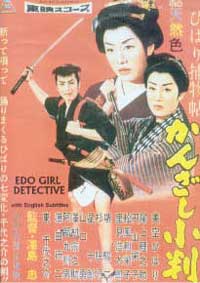 Hibari torimonochou: kanzashi koban was titled in English The Golden Hairpin on an old subtitled film print, but Edo Girl Detective on a contemporary poster & is also known as Detective Hibari 1: The Case of the Golden Hairpins (1959). It was a star vehicle for Hibari Misora, more or less of the "singing samurai" genre of upbeat family-suitable adventure. Hibari torimonochou: kanzashi koban was titled in English The Golden Hairpin on an old subtitled film print, but Edo Girl Detective on a contemporary poster & is also known as Detective Hibari 1: The Case of the Golden Hairpins (1959). It was a star vehicle for Hibari Misora, more or less of the "singing samurai" genre of upbeat family-suitable adventure.
The same year, she played the same period detective in Secret of the Golden Coin (Hibari torimonocho: jiraiya koban with a recurring supporting cast. A third film in the series was Hibari Detective 3: The Hidden Coin (Hibari Torimonochou: Furisode koban, 1959).
She stars in additional detective-samurai films but these three are specifically a set in which she plays the same character, & they're structured about the same.
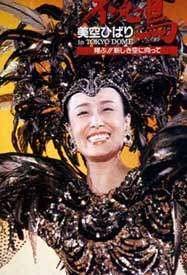 Hibari was a gigantic post-war hit-making singer who was said to have helped Japan heal from defeat with her love songs that were listened to as though to a nation. Hibari was a gigantic post-war hit-making singer who was said to have helped Japan heal from defeat with her love songs that were listened to as though to a nation.
One of these songs spoke of "your judo spirit" which just melts the heart, & has emotional impact even if you don't understand the language. Several of her songs remain to this day as "standards" as the best of an Edith Piaf or Judy Garland.
And like Judy Garland, she started out entertaining when she was just a kid. Born in Yokohama in 1937, of Korean descent, she was originally named Kazue Kato.
Her performance name Hibari Misora means "Songbird in a Beautiful Sky." She began filming her first feature at age 11 & by age twelve was already a household name throughout Japan.
She died rather young, at age 52, of a hepatitis-related illness, though it was given out that she died of pneumonia because of the associations of chronic hepatis with drug use.
She looks quite ill in her final concert, called The Phoenix Concert (Fushichou Konsaato, 1988) because it was widely believed she was getting well. She was in fact in great pain that night. She could've been mistaken for a woman fifteen years older, but her voice was still in great shape, & as it turned out, it was to be her farewell concert, & a great one happily recorded for posterity.
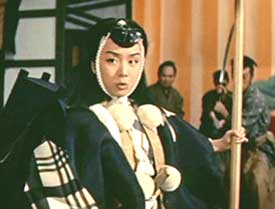 Hibari was a lesbian (once married & quickly divorced late her life) & because another singing actress from America was internationally believed to be the same (whether true or not), Hibari was frequently called "The Japanese Doris Day." Though in terms of talent I really do think Piaf is a better comparison. Hibari was a lesbian (once married & quickly divorced late her life) & because another singing actress from America was internationally believed to be the same (whether true or not), Hibari was frequently called "The Japanese Doris Day." Though in terms of talent I really do think Piaf is a better comparison.
Her co-stars in Hibari torimonocho: Kanzashi Koban were Kotaro Satomi as a ronin & leading man, plus Chiyonosuke Azuma, Shunji (aka Junji) Sakai, Kenji Susukida & Koinosuke Onoe.
Hibari plays the woman detective Oshichi who lives as a townswoman & works as a professional singer as her "cover." But she's secretly Princess Tae, & has a semi-official status as an undercover Edo magistrate.
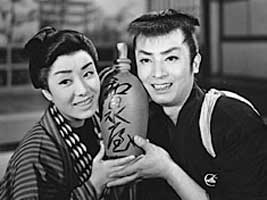 She sets out to solve the mystery of two young women's murders, & prove herself a master of disguise along the way. She sets out to solve the mystery of two young women's murders, & prove herself a master of disguise along the way.
The detective story unfolds pleasantly enough with a bit of action, a bit of comedy. In the latter category, she gets roaring drunk with her ronin pal & they sing a wonderful ode to sake.
The climactic highlight focuses on her dancing skill, her notoriety for androgynous cross-dressing, & her ability to fight. She performs a wonderful dance as Benkei, the warrior monk who served Japan's primary national hero Yoshitsune Miyamoto.
She is doing this performance while undercover in a brothel, & it is part of an "onna kabuki" performance wherein Hibari would quite naturally be playing the male role, permitting her to dress in the theatrical costume of the famous monk. The dance ends up in a real duel for her life, monk's staff vs swords, then with her own deadly sword, all excellently choreographed.
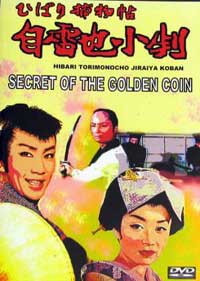 As tales of murder go The Golden Hairpin is all very upbeat & lighthearted. And there's no question but that Hibari had charisma. As tales of murder go The Golden Hairpin is all very upbeat & lighthearted. And there's no question but that Hibari had charisma.
The sequel featured Juro Hoshi, Ryozo Kasahara & Eitaro Shindo in another tale of comedy & detection.
It is more of the same with the same key players in Edo Girl Detective: Secret of the Golden Coin Oshichi finds herself falsely charged with a crime.
While evading a corrupt magistrate who plots to kill Oshichi's brother Lord Iyo, she sets out to clear her name, an unusual sword as her primary clue.
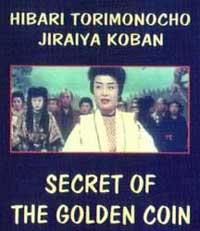 Following the formula of the original film, Hibari gets another drinking scene, very charming, while singing a boogy-woogy drinking song amusing out of period. Following the formula of the original film, Hibari gets another drinking scene, very charming, while singing a boogy-woogy drinking song amusing out of period.
She & her love-interest & best pal the singin' drinkin' ronin (Chiyonosuke Azuma) try to out-drink each other, getting sillier & sillier, until it turns into a big taiko drumming with song & dance number.
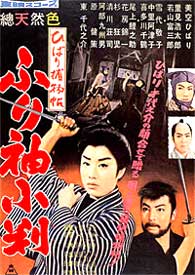 Rarely do musical numbers slip into films with such ease & believability as in a Hibari film, but I found myself believing these drunks, in this place, really would burst into song & inspire everyone around them to start dancing. Rarely do musical numbers slip into films with such ease & believability as in a Hibari film, but I found myself believing these drunks, in this place, really would burst into song & inspire everyone around them to start dancing.
The climax incorporates another marvelous theatrical dance & swordplay piece, highly traditional, with Hibari riding a giant toad to fight an enemy with a serpent, & looking surprisingly god-like.
As in her Benkei performance in the other film, the play ends with a real assault, & what started as a stage performance turns into earnest duelling for her life. It's a tremendous climax, with Hibari's stunning physicality beautifully displayed.
Hibari returned for a third outing as as Oshichi the Edo girl detective in The Hidden Coin. Once again she is assisted by her brother Hyoma (Kotaro Satomi) & her ronin pal (Chiyonosuke Azumi), & guest-starring Tomisaburo Wakayama. This time following the mysterious secret of a coin left behind at a murder. A complete review is forthcoming.
copyright © by Paghat the Ratgirl
|
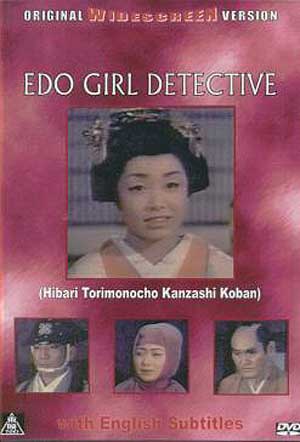




 As tales of murder go The Golden Hairpin is all very upbeat & lighthearted. And there's no question but that Hibari had charisma.
As tales of murder go The Golden Hairpin is all very upbeat & lighthearted. And there's no question but that Hibari had charisma. Following the formula of the original film, Hibari gets another drinking scene, very charming, while singing a boogy-woogy drinking song amusing out of period.
Following the formula of the original film, Hibari gets another drinking scene, very charming, while singing a boogy-woogy drinking song amusing out of period. Rarely do musical numbers slip into films with such ease & believability as in a Hibari film, but I found myself believing these drunks, in this place, really would burst into song & inspire everyone around them to start dancing.
Rarely do musical numbers slip into films with such ease & believability as in a Hibari film, but I found myself believing these drunks, in this place, really would burst into song & inspire everyone around them to start dancing.